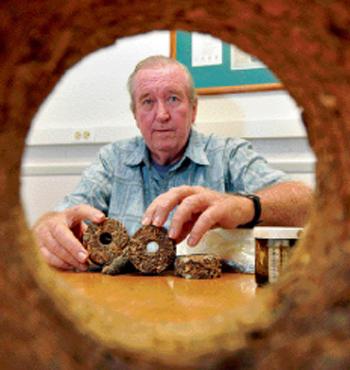LIHU‘E — Ever wonder what good could possibly come of plastic, or how the waste clogging Kekaha’s landfill might be put to better use?
John Hoff, a long-time resident of Lawa‘i, says there is a simple solution for turning trash into a renewable resource treasure that won’t cost taxpayers “one red cent.”
Fuel pellets made of green waste and crude oil made from carbon in plastics are just a fraction of what a materials recovery facility can do, Hoff said. He is proposing to bring a MRF (pronounced ‘murf’) to Kaua‘i in collaboration with Western Renewable Energy and CarbonTech.
“Everybody is concerned about plastic bags; we actually want your plastic,” he said in an interview last week.
With the $100 million WRE has already set aside for the project, the potential for the island to become almost entirely self-sustainable in a few years is more than just a possibility, according to Hoff.
“We have a huge problem with solid waste and electrical cost … we’re tied to foreign oil,” he said.
Hawai‘i is the most petroleum-dependent state in the nation and also pays the highest in electricity and gasoline prices, according to House Bill 1464, which would implement a 40 percent shift toward the use of renewable resources on the islands by 2030.
Hoff said WRE can transition the island to “green energy” within the next two or three years without “needing to wait until 2020 or 2030,” as others are planning.
The MRF would convert Kaua‘i’s green waste into alternative fuel pellets which could then be burned to generate heat in an “earth-friendly manner” and create electricity for the island, according to Hoff.
What’s more, electricity costs would be slashed by possibly eliminating the “energy adjustment” charge on KIUC’s monthly bills, he adds.
Jose Bulatao Jr., a lifelong Kekaha resident, backs the proposition.
“I’ve been supportive of the concept in trying to bring about alternative renewable energy so that we can be less dependent on fossil fuel,” Bulatao said Sunday. “Our island and our entire state is overly dependent on fossil fuel for energy and transportation needs.”
He said he is hopeful that government officials will at least take the proposal into consideration and “open up the opportunity for discussion and dialogue.”
“Baby steps are just as important as giant leaps,” Bulatao said. “We need to be a little bit more aggressive and yet responsible in the ways we seek out what would be doable.”
Not only does Hoff envision an island re-using its waste to generate electricity and oil, he also said construction materials — strong enough to endure hurricanes and extreme temperature fluctuations — could be created with the facility as well, among many other sustainable projects.
“This program will also bring hundreds of jobs to our island as well as establish a manufacturing company turning our waste into commercially viable products such as building blocks for affordable housing as well as high end construction,” Hoff said in an e-mail Wednesday.
Bulatao said there are likely stakeholders who “may be reluctant to see changes occur,” which is a natural and expected reaction.
On the other hand, he added, “we should really be looking at this seriously.”
“I don’t want to be held hostage to the powers to be and their time tables,” Bulatao said.
He added that if the proposal does happen to be a viable solution to Kaua‘i’s solid waste problem and extreme dependence on petroleum, then it should be looked at “judicially” and all elements would need be taken into consideration before implementation, including any adverse environmental impacts.
“This is all focused on sustainability,” Hoff said. “This is what it’s all about.”
• Coco Zickos, business and environmental writer, can be reached at 245-3681 (ext. 251) or czickos@kauaipubco.com.





